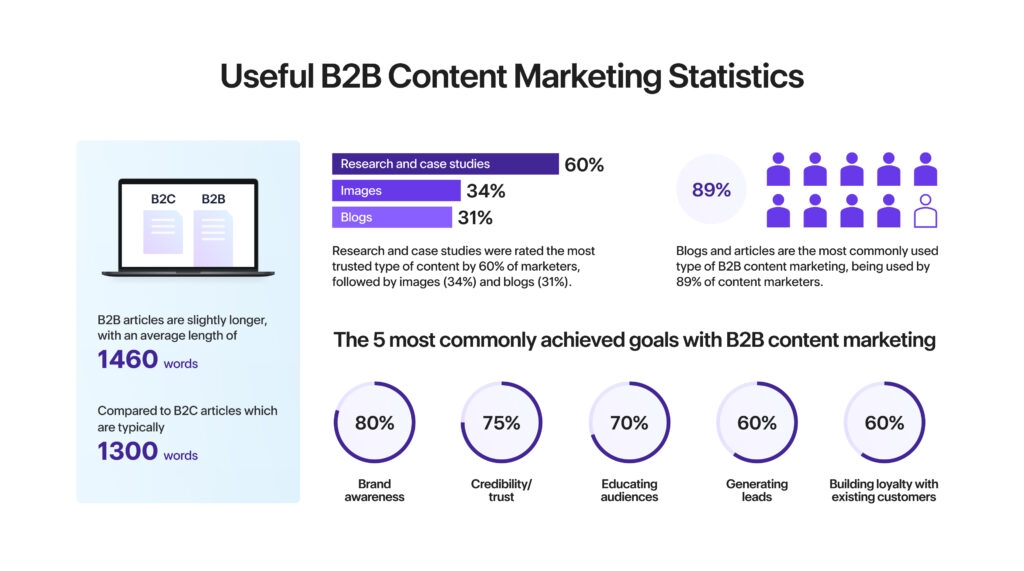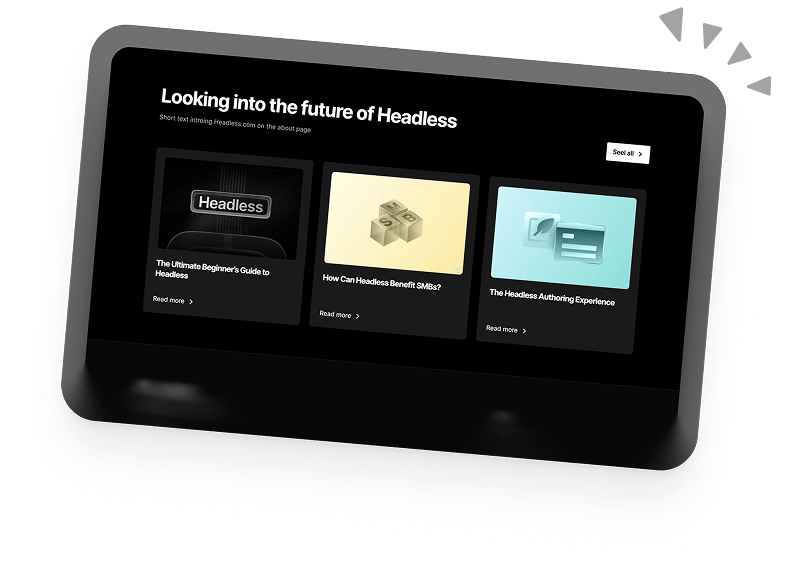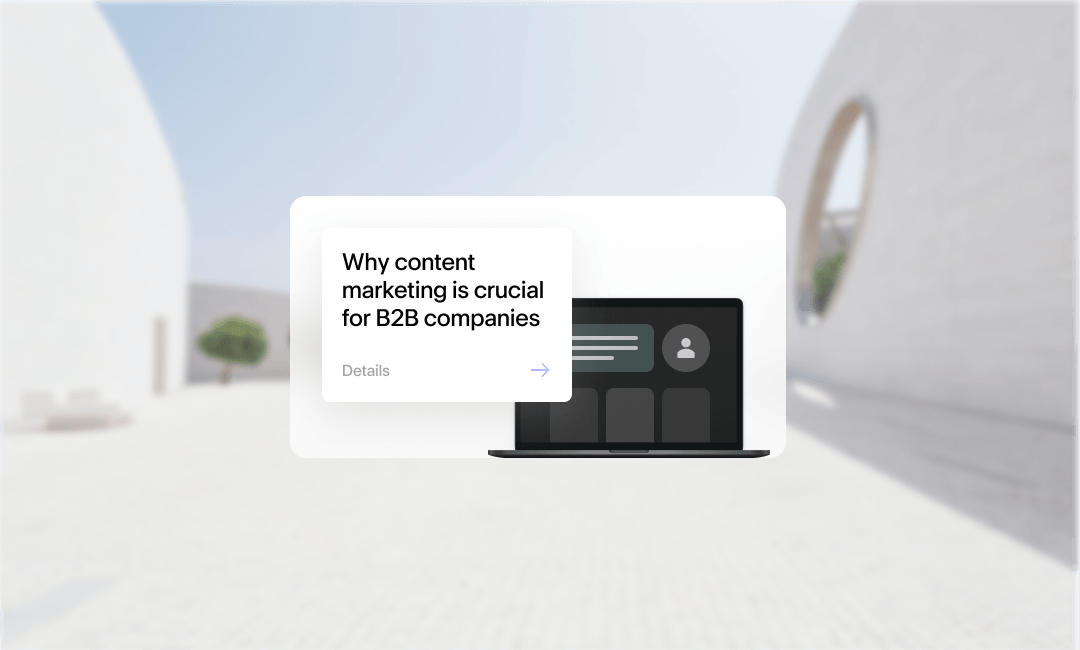Why Content Marketing is Important For B2B Companies
Summary: Content marketing is a critical tool in your arsenal and it can effect every aspect of your business. B2B companies, especially, can benefit from content marketing since it’s an effective way to establish credibility and nurture leads through the lengthy B2B sales journey.

Why is content marketing important in B2B?
B2B content marketing is a great way to engage with your audience as it shows them that you understand their pain points and needs. B2B content marketing is a crucial part of your marketing strategy because it:
- Builds trust with your audience
- Boosts traffic and brand awareness
- Enhances lead generation & lead nurturing
- Is cost-effective
Is your content marketing not getting the results you want? Then perhaps it’s time to re-examine and refine your content strategy.
And if you’re unsure about investing in B2B content marketing then, by the time you’re finished reading, I hope to have convinced you that content marketing is one of the most important and effective tools to revamp your brand presence, lead generation, conversions, and revenue.
In this article, we’ll be taking a look at the benefits of content marketing, why it’s so important for B2B marketing, and the ways you can use it to start hitting those KPIs.
Hold onto your hats folks. We’re going in!
Content marketing builds trust
B2B Buyers: they’re just like regular people. They have trust issues.
Credibility is central to all marketing and carries a lot of weight for your brand. B2B and B2C consumers alike want to be sure that they’re getting their money’s worth.
Arguably, this is even more important with B2B sales. You’re looking at large investments of time and money. That’s why a sale to a new customer usually takes 4-6 months to close.
And during that time, you can’t sweet-talk them into a deal. Buyers will spend 27% of their journey doing independent research online compared to just 17% of their time meeting with potential suppliers.
How does content marketing build trust?
Content marketing helps you establish authority in your field.
Your content should show people that you know what you’re talking about. Publishing thought leadership articles, research, case studies, and instructional articles/videos is a great way to show your credibility. Sure, your clients might already know a lot of this stuff, but they’ll want to know that you know it too.
Or, even better, you might teach them something or make them think about a topic in a way they hadn’t done before. If you can make them slowly stroke their chins, nod, and say “hmm”, then you’re killing it.
Content marketing increases organic traffic and brand awareness
You need to have a lot of people at the top of your marketing funnel. Otherwise it’s just a marketing pipe.
The average visitor to lead conversion rate for a standard web page is 2.4% and around 4% for a lead generation landing page. Of course, this varies depending on your industry and marketing channels.
The point is that to start getting customers, you need to boost your traffic and presence. We are, of course, talking about the good old SEO. Working with SEO is a rollercoaster, you’re either giddily watching numbers go up or you’re lying awake at night obsessing over the ramifications of a core algorithm update.
SEO is one of the best ways to get new people to your website and one of the most common uses of content marketing.
Producing high-quality, keyword optimised content can get you into that coveted first page of Google. And once you get there, it’s a real game changer in terms of traffic. Not only that, but there’s a certain prestige that comes with ranking high on Google. It’s essentially like an endorsement from Google that your site is trustworthy and your content is valuable.
Brand awareness
Getting high rankings on Google has a knock-on effect on your brand awareness. Even if people don’t click on your content straight away, if you keep popping up in their search results, they’ll start to recognise and remember your brand.
This is because of a principle in social psychology called The Familiarity Principle (also known as the “Mere-exposure effect”) which dictates that humans have a tendency to favour things that they have been repeatedly exposed to.
B2B Social media content marketing
Posting regularly on social media is another great way to increase your brand awareness. You can also use it to share links to your on-site content and grow your traffic.
In terms of exposing new people to your brand, social media isn’t as reliable as SEO. After all, for the most part, unless you’re paying for ads, your content is going to appear to people who already follow your page. The best way to get people discovering you on social media is by creating shareable content.
Viral marketing isn’t as much of a thing in the B2B space as it is for B2C marketers, however people still share content that resonates with them. And this opens up the opportunity to reach hundreds or even thousands of new people.
B2B Content marketing is important for lead generation and lead nurturing
Networking. It’s more than just an excuse to write off cocktails as a business expense.
Building and nurturing relationships with clients and prospects is an essential part of B2B Marketing. Attending in-person events is one of the best ways to grow your business relationships, but content marketing factors in too.
Lead Generation
Content marketing is a type of “pull” marketing. (As opposed to “push” marketing techniques which directly present your services). You attract people with relevant content and then direct them further down the ol’ marketing funnel.
It’s a tale as old as time: Someone finds your content on Google, they read and enjoy your content, a Call-To-Action guides them to a piece of gated content, they use their email address to download the content. Et voila! You got yourself a lead.
Remember that the B2B sales cycle can take months. During this time, you’ll need to nurture the relationships that you’ve built.
Now, if you’ll forgive me, I’m about to illustrate this point with an analogy.
Content marketing is like a first date
Let’s say you meet someone, you’re very attracted to them, and you go on a date together. Maybe you share a bowl of spaghetti and meatballs in an alley while being serenaded by an Italian man with an accordion. The caterpillars you ate for breakfast are blossoming into butterflies in your stomach. At the end of the evening you share a kiss. You like the kiss. They like the kiss. It’s gone well.
The next day, you want to go on a second date. Do you:
- A) Stare at your phone, waiting for a message from them?
- B) Post a flattering selfie on your Instagram and wait for them to give it a like?
- C) Send them a casual text?
If you answered C, then you’ve got the right idea on how to nurture your leads. However, option B, is where content marketing comes in.
Okay, we’ve had our fun. Enough of the analogies.
How to nurture leads with targeted content marketing
Reaching out directly to a lead is a good nurturing tactic but email marketing isn’t technically content marketing. But your content still plays a big part in your lead nurturing strategy.
Nurturing leads isn’t all about direct contact. Aggressive follow-up emails and calls can be deterring for potential clients. (Just because I downloaded an eBook one time doesn’t mean I want you to call and email me everyday, Jessica.)
With content marketing, you take a more indirect approach. Using your buyer persona, you create content that your leads would find helpful. AKA targeted content.
Targeted content is content aimed at a specific niche of your audience and reflects a specific need, interest, or pain point of that group. The goal with targeted content is to move visitors further down the sales funnel.
Using Lead Management tools, you can find out what content your leads and prospects are engaging with and use it to tailor your content strategy. With this approach, you refine your content and give your leads more of the thing that attracted them to your brand in the first place.
For example, let’s say you sell furniture and you’ve noticed that a lot of people are reading your post on “The Top 10 Desks For Your Home Office”. Clearly, people are thinking about buying desks. Now, if you write another post called “How To Choose The Perfect Desk For Your Home Office”, you’ve produced content that not only targets a specific group (people looking for desks) but addresses a potential pain point (decision-making anxiety).
This is the crux of content marketing: being audience-driven. You’ve gotta give the people what they want.
Content Marketing is cost-effective
Saving the best ‘til last!
One of the most important benefits of content marketing in B2B (or anywhere) is how efficient it is. Producing a piece of content isn’t terribly expensive and, when it comes to value, content marketing is the gift that keeps on giving.
If you create “evergreen content” (that is: content that’s always going to be relevant), you can just sit back and let it do its thing.
And possibly the single greatest thing about content marketing is repurposing content.
Let’s say you’ve written an e-Book. Well, you can take segments of that content and rework them into posts for your blog. These blog posts can then be condensed even further into social media posts.
There are lots of ways that you can do this: sections of long articles can be turned into shorter articles, an hour long podcast video can be cut into clips to share on social media or insert into blogs, and vice versa you can use blog posts to create video content.
Updating content
What’s more, you can update your content over time. Sprinkle in some more current information into a popular article and you’ve got yourself a low-effort way to make relevant content. Also Google loves “fresh content”, so updating posts is a great way to get a ranking boost.
Conclusions
This article has touched on the key benefits of B2B content marketing but in the future we hope to post some more in-depth content and guides to specific aspects of content marketing. So watch this space!
In the meantime, you can explore some of our other B2B guides:
Book a 30-min Introduction Call
Let's jump on a quick intro call We'll break down your project, and pinpoint exactly how we can help.



Our clients  Holaa! love working with us see their stories below!
Holaa! love working with us see their stories below!






